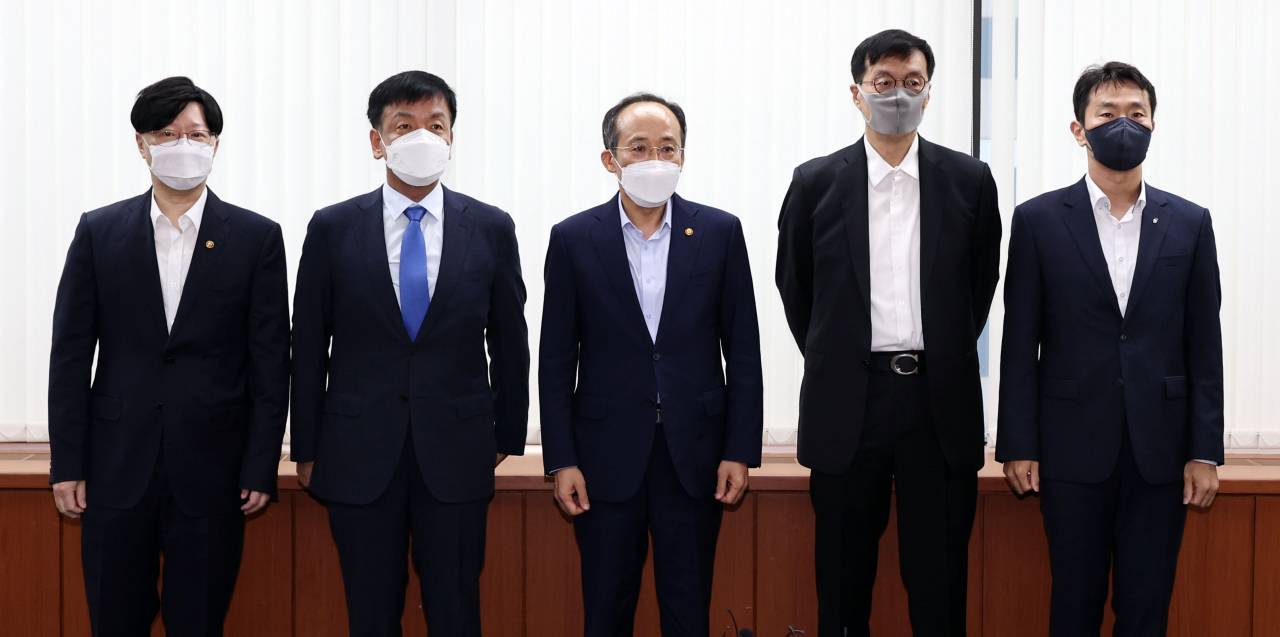Preemptive measures in store to tackle risks from rising rates: chief policymakers
By YonhapPublished : July 4, 2022 - 09:22

South Korea's finance minister, the central bank chief and financial regulators said Monday they will step up policy coordination to minimize fallout from rising interest rates at home and abroad.
In a meeting presided over by Finance Minister Choo Kyung-ho, they discussed economic and financial situations amid heightened external economic uncertainty from the prolonged war between Russia and Ukraine, and the Federal Reserve's aggressive monetary policy tightening.
The meeting brought together Bank of Korea (BOK) Gov. Rhee Chang-yong; Lee Bok-hyun, chief of the Financial Supervisory Service (FSS); Kim So-young, vice chair of the Financial Services Commission; and Choi Sang-mok, senior presidential secretary for economic affairs.
They shared the view that they should make joint efforts to deal with economic risks, as the current "complex" economic crisis facing Asia's fourth-largest economy is expected to prolong for a considerable period of time.
"The participants agreed to preemptively respond to the situations in a bid to prevent macroeconomic risk factors from materializing amid rising interest rates at home and abroad," the finance ministry said in a statement.
Central banks around the world have kicked off monetary policy tightening drives in a bid to curb inflation caused by high energy costs and a rebound in demand from the pandemic.
Last month, the Fed raised its key rate by 0.75 percentage point, the sharpest hike since 1994, and signaled it could raise the rate by a similar magnitude in July.
The BOK is also widely expected to raise the key interest rate at its policy meeting set for July 13. Some experts forecast the BOK may conduct an unprecedented "big-step" rate increase of 50 basis points to tame inflation.
The BOK has hiked the policy rate five times -- all by a quarter percentage point at a time -- since August last year to 1.75 percent.
The country's inflation growth is likely to soar to the 6 percent range in June, after spiking 5.4 percent on-year in May, the fastest in almost 14 years.
As for a possibility of the big-step hike, BOK Gov. Rhee said last month the central bank will comprehensively take into account the economic situation, including currency volatility and household debt.
A rate hike is meant to curb inflation, but could increase debt-servicing burdens and slow down an economic expansion.
South Korea's household credit hit an all-time high of 1,859.4 trillion won ($1.4 trillion) as of end-March.
Later in the day, FSS chief Lee held an emergency risks management meeting with his staff and ordered beefed-up monitoring of local financial firms, which could face more borrowers defaulting on their debts with interest rates on the rise.
He also urged his staff to stay alert and draw up countermeasures against the possibility of worsening asset soundness of financial firms turning into major risks and spilling over into the overall financial system.
The South Korean economy is at risk of losing steam as deteriorating external economic conditions could dent investment and export growth.
The finance ministry forecast economic growth to slow to 2.6 percent this year from the 4 percent expansion last year. The government expected inflation to jump to a 14-year high of 4.7 percent this year from 2.5 percent in 2021.
The BOK put its 2022 growth forecast at 2.7 percent and expected consumer prices to rise 4.5 percent this year.
Market volatility has recently amplified, gripped by the prospect of the Fed's aggressive rate hikes and fears about a global recession.
The South Korean currency fell below the 1,300-won level against the dollar for the first time in nearly 13 years on June 23. The won has slid more than 8 percent against the greenback so far this year. (Yonhap)








![[Graphic News] More Koreans say they plan long-distance trips this year](http://res.heraldm.com/phpwas/restmb_idxmake.php?idx=644&simg=/content/image/2024/04/17/20240417050828_0.gif&u=)
![[KH Explains] Hyundai's full hybrid edge to pay off amid slow transition to pure EVs](http://res.heraldm.com/phpwas/restmb_idxmake.php?idx=644&simg=/content/image/2024/04/18/20240418050645_0.jpg&u=20240419100350)






![[From the Scene] Monks, Buddhists hail return of remains of Buddhas](http://res.heraldm.com/phpwas/restmb_idxmake.php?idx=652&simg=/content/image/2024/04/19/20240419050617_0.jpg&u=20240419175937)

![[KH Explains] Hyundai's full hybrid edge to pay off amid slow transition to pure EVs](http://res.heraldm.com/phpwas/restmb_idxmake.php?idx=652&simg=/content/image/2024/04/18/20240418050645_0.jpg&u=20240419100350)

![[Today’s K-pop] Illit drops debut single remix](http://res.heraldm.com/phpwas/restmb_idxmake.php?idx=642&simg=/content/image/2024/04/19/20240419050612_0.jpg&u=)